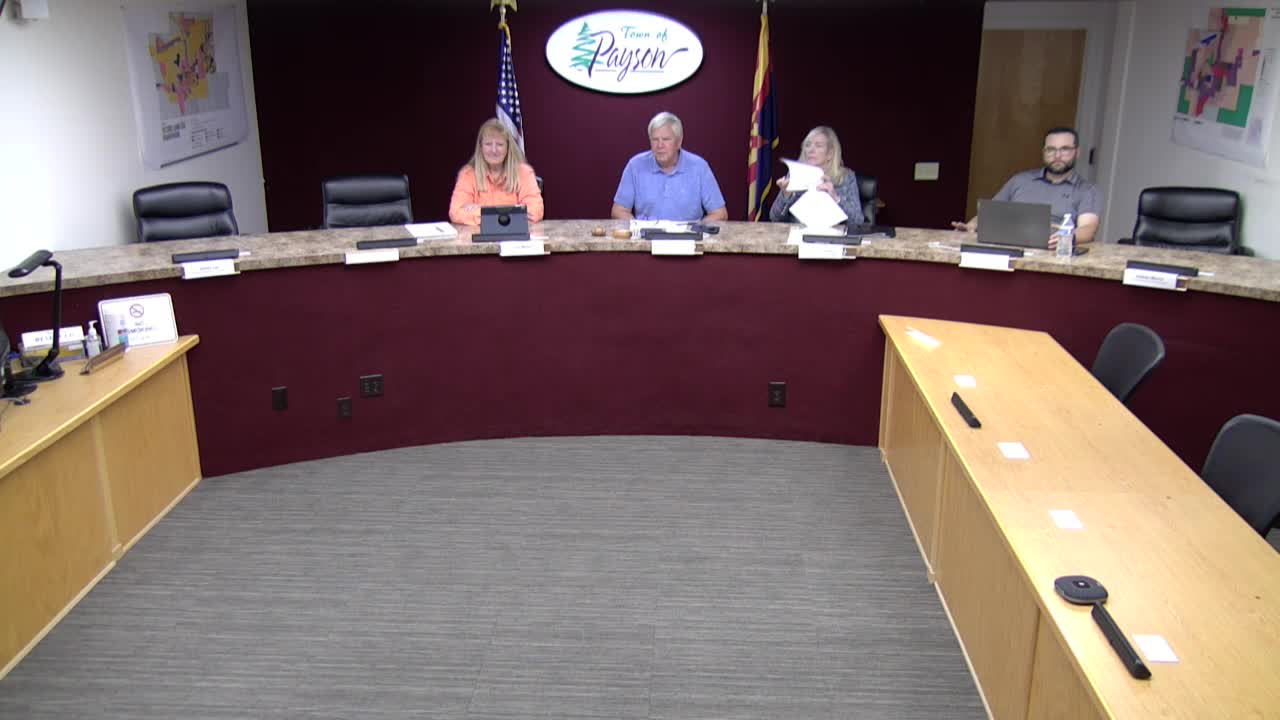Payson water director outlines supply portfolio, recharge strategy and development review process
Get AI-powered insights, summaries, and transcripts
Subscribe
Summary
Payson Water Department Director Tanner Henry briefed the Planning and Zoning Commission on local water resources, the town’s aquifer storage and recovery program, C.C. Cragin surface‑water allocation and how the department evaluates development proposals and water‑use fees.
Tanner Henry, the Town of Payson water department director, told the Planning and Zoning Commission the town currently uses about 1,800 acre‑feet of water a year and manages a portfolio of groundwater, reclaimed‑water recharge at Green Valley Lakes and surface‑water allocations from the C.C. Cragin Reservoir.
Henry said the town’s planned water supply portfolio is roughly 4,500 acre‑feet and that town operations and injection projects allow the town to stretch surface allocations and protect its C.C. Cragin entitlement. Henry described the mechanics of aquifer storage and recovery (ASR) wells, SCADA‑controlled flow valves and weekly coordination with the sanitary district on Green Valley Lakes monitoring.
Why it matters: Water availability and the town’s ability to serve new development determine whether subdivisions and commercial projects can proceed and what system improvements, fees or mitigation are required. Henry explained how the water department evaluates development proposals for fire flows, meter and main extensions, and whether a booster station or other improvements are needed.
Key figures and technical points Henry gave during the briefing included: average annual precipitation in Payson of about 18 inches; current consumption about 1,800 acre‑feet per year; an estimated safe yield from groundwater of about 2,520 acre‑feet per year and natural recharge of roughly 2,282 acre‑feet; and an additional allocation of about 3,000 acre‑feet available from the C.C. Cragin project. Since 2019, Henry said the town has put water back into the aquifer through ASR wells and has stored roughly 3,000 acre‑feet overall in recent years.
Henry described the water‑order process with Salt River Project (SRP): each year Payson and SRP estimate reservoir inflows and the town submits an order indicating when it prefers SRP to run pumps and deliver water over the rim; Payson tries to stretch surface deliveries across the dry season and inject unused water into ASR wells to establish beneficial use. "The doctrine is, you use it or lose it," Henry said of surface‑water allocations, adding that recharge and a water‑conservation plan with the state help the town preserve its entitlement.
On development review and fees, Henry said developers must provide engineered plans for public mains, get Arizona Department of Environmental Quality (ADEQ) approval to construct, complete disinfection and bacteriological testing, then receive ADEQ approval before the town provides service. The town currently charges a water‑system impact fee of $3,391 per equivalent dwelling unit (EDU); developers sometimes use payment plans for large projects and a three‑year true‑up is applied if consumption estimates are off.
Commissioners asked about triggers for water‑shortage stages, water‑main conditions and PFAS treatment. Henry said the town has stage triggers in code when consumption exceeds production capacity and that some older mains (up to 70 years old) were identified for replacement; recent federal PFAS requirements have shifted prioritization of capital work. He said the town does not currently hold an assured 100‑year water supply designation because it is outside an active management area, though staff are discussing whether to pursue one to lock in long‑term assurances.
No formal action was taken; the presentation closed and Henry agreed to share his slides and supporting reports with commissioners.
